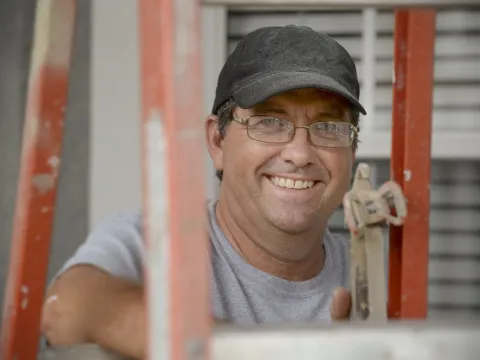- AdventHealth

If you snore loudly, chances are you've been the target of bad jokes and a few middle-of-the-night elbow thrusts. Yet habitual snoring is no laughing matter. It may signal a life-threatening disorder: obstructive sleep apnea.
What's Sleep Apnea?
Sleep apnea is a chronic and common disorder where pauses in breathing or shallow breathing occur. Each pause, called an apnea, can last from a few seconds to minutes, and may occur 30 times or more per hour.
Typically, normal breathing starts again, sometimes with a loud snort or choking sound. But the result is poor sleep quality, making you extremely tired during the day.
Left untreated, it may lead to high blood pressure, heart attack, stroke, obesity and diabetes. And it poses an increased risk of arrhythmias (irregular heartbeats) and even heart failure.
More than 18 million Americans are affected, and continuous positive airway pressure (CPAP) is the most common treatment, says J. Scott Magnuson, MD, otolaryngologist at AdventHealth.
Worn during sleep, the devices resemble something out of a science fiction movie. Using mild air pressure, CPAPs keep airways open. Over time, patients may grow frustrated with CPAPs or stop using them, causing sleep apnea to return and leaving them anxious for a better solution.
A New Option
TransOral Robotic Surgery (TORS) an innovative, minimally invasive technique may be an option for those who prefer not to use CPAPs or aren't getting the results they desire.
Using the da Vinci Robotic Surgical System, areas of the throat once difficult to reach can now be accessed. Unlike traditional open surgery, TORS provides surgeons with enhanced agility, precision and a 3-D advanced imaging system. Because the procedure is performed through the mouth, there is no visible scar, less blood loss and a faster recovery.
For patients with severe sleep apnea, obstructive tissue in the tongue base can be removed via TORS. Also, placement of a temporary tracheostomy (because of swelling typical of open-throat surgery) can usually be avoided. And the patients' ability to speak and swallow is not interrupted.
Before, surgery was a last resort, says Dr. Magnuson. Now, were able to remove tissue that contributes to airway blockage with no external incisions, and patients go home the next day, sleeping healthfully.
Michael's Moment
Michael Johnson, 44, of Celebration, says he has never slept well. I'd wake during the night and have trouble going back to sleep. The next day I'd drink six energy drinks to stay awake.
After hearing his snoring and abrupt awakenings on a camping trip, a friend suggested it might be sleep apnea. Michael had two sleep studies and sinus surgery and tried a CPAP (continuous positive airway pressure) machine, but nothing worked. Then he saw Jeffrey J. Lehman, MD, and learned about the TORS procedure (see right), which was performed in September 2012.
I could breathe better immediately, says Michael. The procedure has been life-changing. Now when I sleep, I wake well-rested and alert.



